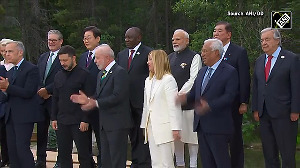'When so many young Baloch men and women are willingly volunteering as fighters and even suicide bombers.'

"Baloch live in hardship, with limited access to education, jobs, healthcare and infrastructure.
"The province's vast natural wealth has yet to translate into prosperity for its people, fuelling discontent and socio-economic disparities.
"The provincial government is widely regarded as highly corrupt.
"There is an unwritten arrangement between Islamabad and the Balochistan government that corruption, nepotism and inefficiency are tolerated as long as they remain loyal to the pro-Pakistan establishment," journalist and Balochistan specialist Malik Siraj Akbar tells Rediff.com's Archana Masih in the concluding segment of a must-read interview.
- Part 1 of the Interview: 'Blaming India Is Pakistan's Go-To Excuse'
- Part 2 of the Interview: 'Pakistan Seen As A State Devoid Of Hope'
- Part 3 of the Interview: The Lady Doctor Taking On The Pakistan State
Where does BLA get money, weapons and its zeal from? How would you compare it with other armed separatist groups in the world?
My thoughts on the BLA's funding sources are purely speculative -- I do not know definitively who finances the group.
However, I have consistently pushed back against the assumption that India is the primary sponsor. I agree with the Indian author Tilak Devasher, who argues that India has neither the need nor the incentive to support the Baloch movement when so many young Baloch men and women are willingly volunteering as fighters and even suicide bombers.
While it is true that running an insurgency as effective as the BLA's requires substantial funding, I do not believe financial incentives are what drive most young Baloch to join.
The motivations for joining the movement vary widely. Each fighter has a different story; not everyone is drawn in by personal loss or direct victimhood.
For instance, I know many young Baloch whose family members were forcibly disappeared or killed, yet they have not taken up arms.
Instead, figures like Mama Qadeer of the Voice for Missing Baloch Persons -- whose son, Jalil Reki, was abducted and later killed -- have remained committed to peaceful activism.
Similarly, Dr Mahrang Baloch, the most prominent leader among Baloch youth, has chosen peaceful resistance despite her father, Ghaffar Langvo, being forcibly disappeared and reportedly killed by the Pakistani state.
In contrast, some Baloch women have become suicide bombers for the BLA despite having no direct family connection to victims of State violence. This highlights the diverse motivations driving the insurgency. There is no one description that fits all the BLA fighters.
Many educated Baloch with no personal experience of persecution still join the movement, driven by the collective trauma they witness.
Seeing helpless Baloch mothers and sisters protesting outside press clubs and courts -- begging for the release or return of their loved ones -- ignites their sense of outrage.
For these youth, simply witnessing such daily suffering is enough to push them toward armed resistance.

How do ordinary citizens view BLA and other separatist groups? Are they caught in the crossfire between a Pakistani military state and a violent group?
In Balochistan (like many other tribal regions), people generally feel strongly connected with those who belong to their tribe or speak their language.
This nature of the Baloch often leads to suspicion toward outsiders (such as Punjabis going to Balochistan for economic reasons), even if they have good intentions and genuine needs to be in Balochistan.
Consequently, the BLA, being composed of locals, tends to garner more support than Pakistani soldiers from other provinces on any given day because the Pakistani soldiers are viewed as outsiders and as an abusive occupying force.
In this context, you can say that the BLA is widely seen as the 'home team' in Balochistan.
While there may be some resistance to the BLA's actions -- such as when it targets fellow Baloch whom it accuses of being Pakistani spies or attacking Punjabi labourers -- the organisation generally maintains great support among the local population when targeting the Pakistani military and paramilitary forces and members of the local police force.
Overall, there is a collective desire among the Baloch to resist Pakistani policies and practices in the province that are targeted explicitly toward suppressing political dissent, particularly concerning enforced disappearances.
Besides the BLA, there is also great public support for anyone, including political parties and civil society groups that seek justice for the Baloch from Islamabad.
Although the US, the UK and the government of Pakistan have declared the BLA a terrorist organisation, these designations don't significantly change the local communities' existing opinions about the Baloch armed groups.
Within Baloch society, a 'real fight' is traditionally perceived to involve an armed fight rather than democratic movements.
The 'eye for an eye' mentality is prevalent in Balochistan, where fights continue across generations. Consequently, the BLA's militant mindset and actions resonate more deeply with the local communities than non-violent approaches.
While some Baloch political parties and civil rights forums, like the Baloch Yakjehti Committee, engage in peaceful struggle, the entrenched cultural norms view armed resistance as the 'real fight' for the Baloch.
On top of it, the complete failure of democratic institutions and the system in Balochistan, which predominantly serves the Pakistani establishment and offers little to nothing to the Baloch, have also contributed to the public weariness of the democratic system.
They see it as an instrument by the Pakistanis to impose unpopular individuals as their leaders.

What is the state of education, jobs, welfare and livelihood in Balochistan? How do the average Balochis fare and live their lives?
I'm glad you asked this question. The discussion on the insurgency in Balochistan often overshadows critical issues such as education, employment, welfare, and overall livelihood -- factors that directly shape the lives of its people.
In a nutshell, Balochistan has some of the bleakest social indicators in Pakistan. Approximately 63% of the population lives below the poverty line, making it the poorest province in the country.
Access to necessities is severely limited -- around 85% of people lack clean drinking water, and 75% have no access to electricity, although Balochistan is Pakistan's wealthiest province in terms of natural resources, including natural gas, coal, copper and gold.
Education levels are alarmingly low. The province has a literacy rate of roughly 44%, far below the national average of around 60%. The situation worsens in rural areas and among women, where literacy rates drop even further.
Schools suffer from chronic underfunding, lack of infrastructure, and teacher absenteeism, contributing to one of the highest out-of-school children rates in the country.
Regarding employment, Balochistan's economy remains underdeveloped, with most people engaged in subsistence agriculture, livestock farming, and small-scale trade.
Industrial development is minimal despite its resource wealth, leading to high unemployment and economic stagnation.
Many locals feel excluded from the benefits of the province's natural resources, which are primarily controlled by external entities.
There is little evidence that China's economic involvement has created jobs for locals or improved their living standards.
A common complaint among residents is that the Chinese bring their workers, excluding local labour. They neither employ nor trust the locals, relying entirely on their workforce for projects in Balochistan.
The state of healthcare is similarly dire. Balochistan has the worst health indicators in Pakistan, with high maternal and infant mortality rates due to a lack of hospitals, doctors, and basic medical facilities.
Many residents travel long distances to seek medical attention, often in neighboring provinces.
Overall, the average Baloch lives in hardship, with limited access to education, jobs, healthcare and infrastructure.
The province's vast natural wealth has yet to translate into prosperity for its people, fuelling discontent and socio-economic disparities. Addressing these issues requires urgent attention to improve governance, infrastructure and economic opportunities for the people of Balochistan.
The provincial government is widely regarded as highly corrupt. However, the central government overlooks this corruption and mismanagement simply because, unlike insurgents, the provincial government does not pose a direct challenge to Islamabad.
This has led to an unwritten arrangement between Islamabad and the Balochistan government -- particularly its bureaucrats -- that corruption, nepotism and inefficiency are tolerated as long as they remain loyal to the pro-Pakistan establishment.
As a result, the people of Balochistan bear the brunt of this quid pro quo between the Pakistani central government and the province's corrupt political and bureaucratic machinery.
Feature Presentation: Aslam Hunani/Rediff.com











